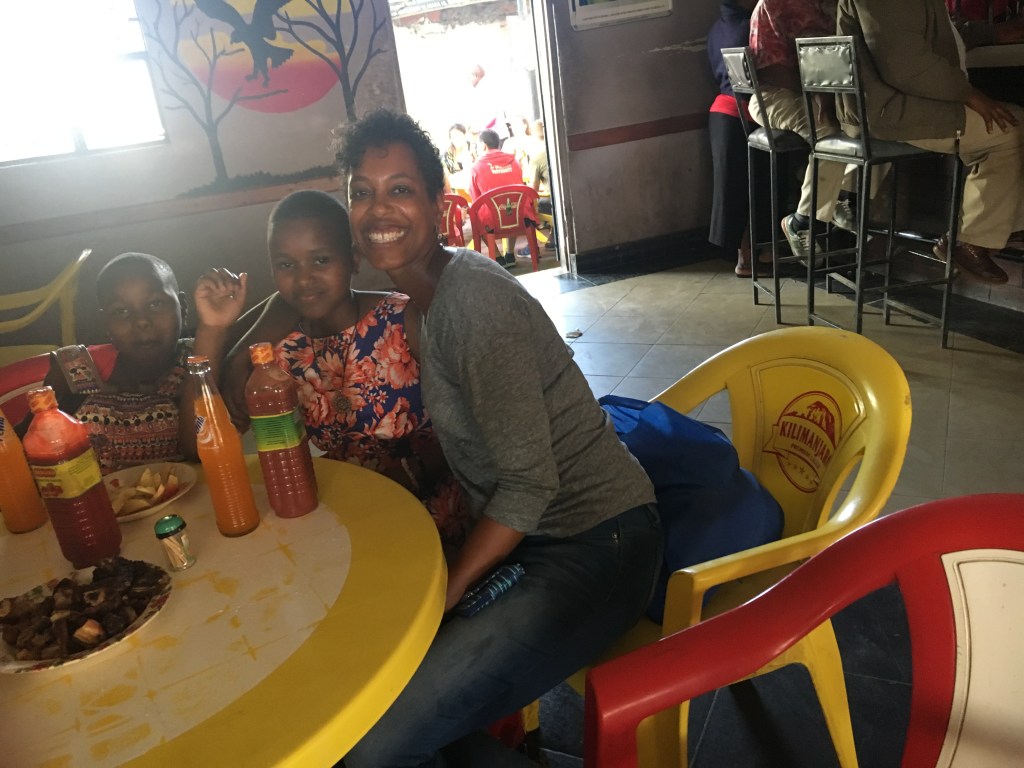
Today when I arrive at Save Africa in the middle of the day, I find Jesca, Jackie, Swaiba and Glory there instead of at school. When I ask why they’re not at school, they tell me they don’t have shoes. If you don’t have the requisite black shoes for school, you can’t attend and theirs have worn away to nothing.
So off we go to Tengeru Market — by dala dala of course — to find them shoes, with strict instructions from Violet to pay nothing more than 18,000 shillings per pair.
Visiting any market in Arusha is an experience with every vendor you walk by vying for your purchase even if you’re not the least interested in what thet have to sell. But Jesca has a singular focus and we head straight for the shoes, the tables and tables filled with them, to begin our search.
The first several they try on either don’t fit or are too expensive, though we manage to find Glory a good pair early on, bargaining our way down from 30,000 shillings to 18. Jesca, who turns out to be a fierce haggler, never wavers from our price, and after a while I start to think we’ll be there all day. We move from table to table amid the cacophony of insistence that these shoes are leather, not plastic; 35,000 shillings is a good price — ok, 25; no, these are not boys shoes; they will fit; and on and on it goes…

In the midst of our search, Jackie tugs on my arm and asks for 100 shillings. She wants to give it to a beggar who has just passed by in a wheel chair. The smallest change I have is 200 shillings, which I hand her, and she runs off after him and drops it in his outstretched cup.
Finally, we settle on three other pairs because I agree to take them at 20,000 shillings each, knowing my presence, despite Jesca’s firmness, is what has driven the prices so high to begin with.
I then suggest we buy some bowls and spoons because I have noticed there are never enough to go around at meal times, so we find a kitchen wares vendor, make that purchase and are done.
Then, because we are already out, and it is way past lunch, I ask if they’d like to get something to eat. We find a local restaurant at the market, with a typical menu of roasted meats, bananas and chips (French fries) and the girls order two plates of chips to split between them, four Fantas and 1 serving of beef for the table.
The owner of the restaurant comes over to introduce himself and seems amiable enough but when our meat arrives, Jesca questions whether they have given us our money’s worth, and though he assures us they have, he brings the chef to our table to affirm what he’s said. Who knew my quiet gentle girl could be so formidable?!
I eat only a few nibbles of meat but the girls keep insisting “Eat,” pushing more toward me. When I say it’s for them to enjoy — any kind of meat is such a rarity at the orphanage — Jesca and Jackie both bring pieces up to my mouth. I oblige but then tell them to finish the rest.

The restaurant owner keeps hovering nearby and finding reasons to approach our table. Jesca is wary and suspicious of him and it turns out she is right to be as he returns at the end of the meal, handing me the business card of a friend he says can help me build a school and suggesting I take his number in case there are business opportunities we might explore, as well.
I tell him I don’t have a Tanzanian number and I’m leaving the next day as I sense Jesca shooting him the meanest stink eye, and then I ask for the bill and we leave — after Jesca gives me an itemized breakdown of everything to ensure I won’t be overcharged.
We decide we will stop at the supermarket on the way back to Save Africa to look for a small treat for Violet, who has asked for a gift from the market.
As we wait for the dala dala back to Leganga, I catch a thoughtful smile flitting across Jackie’s face.
“Today, I enjoy a lot,” she tells me.
And I think what have we done but ridden a crowded mini bus to a crowded market, haggled for shoes, eaten a simple lunch.

On the dala dala, tears slide down my cheeks, as they seem to be doing in more moments during these dwindling days, and I swipe hastily at them before the girls can see. But when Jesca turns to me, my cheeks are still wet and she wipes them with her hands while I explain the dust has irritated my eyes.
At the supermarket, we buy Violet a bag of potato chips — one of her favorite snacks — grab two giant containers of cookies and one candy bar that the girls split among themselves.
We see one of the buses from Haradali School, which some of the kids attend, on our walk back to Save Africa and by the time we get close to the road that takes us there, the kids have gotten off at their stop.
So we all walk back together, Dorcas and Agness holding my hands, all of their gregarious chatter and ebullient laughter floating around me. At one point, Agness leans into me, says “I missed you,” lingers in the crook of my arm. I kiss her forehead, tell her I missed her too, and we walk on, the sun bright on our faces, my heart squeezed with the question: “How will I ever leave?”
